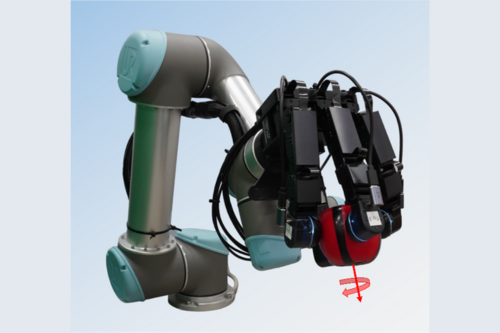Breakthroughs in Artificial Intelligence (AI) are transforming the potential abilities of robots, but the development of robot hardware has not kept pace with innovations in computation.
The Advanced Research + Invention Agency (ARIA) programme is aiming to rectify this, providing a total of £52m to fund projects focusing on advancements in hardware required to improve robot dexterity, such as efficient sensors, bio-inspired robotic hands with rich tactile sensing and innovative skins based on magnetic technology.
Currently robot bodies cannot achieve the flexibility, speed and precision of human physical manipulation. If this can be achieved scientists envision it would enable robots to handle labour-intensive tasks currently carried out by humans in industries such as manufacturing, warehouse logistics, elder care, space exploration and food preparation, where labour shortages are often most severe.
The University of Bristol part of the project will see researchers led by Dr Efi Psomopoulou, Lecturer in the School of Engineering Mathematics and Technology, working with US company Artimus Robotics to develop high performance artificial muscles and integrate them with hand-like robot manipulators. The key will be adopting biologically-inspired design principles to bring together the development of the manipulation framework and the hardware.
The artificial muscles Artimus Robotics are working on are known as HASEL actuators. They will enable lifelike and cost-effective dexterous manipulation for a wide range of markets.
Over the next three years the Bristol research team will work on developing dexterous control frameworks for HASELs and investigating the way the robot manipulator senses the external environment. The intended outcome is a dexterous HASEL-based manipulator that can be evaluated by other ARIA R&D Creators and roboticists in the UK and abroad.
Dr Psomopoulou said: “Robot dexterity implies physical interactions with the environment or humans and those interactions need to be fast, responsive and safe.
“General purpose robot dexterity has been an active unsolved research problem for many years now.
“My vision is to invent a dexterous manipulation framework that can be applied to any type of robot hand morphology and this funding will enable me to work towards this goal. I’m very excited to be part of the Creators within this programme.”
With the proportion of the world population aged over 65 anticipated to triple by 2100, it is thought robots have the potential to ease labour shortages for physically demanding work, improve workplace safety, and radically boost productivity.
For more information about the ARIA Robot Dexterity programme visit: Robot Dexterity
